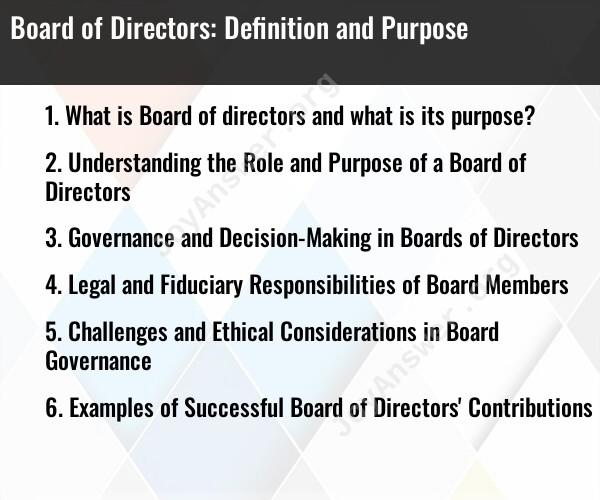What is Board of directors and what is its purpose?
A board of directors is a group of individuals appointed or elected to represent the shareholders or stakeholders of a company or organization. Their primary purpose is to provide oversight, guidance, and strategic direction to the entity they govern. The board of directors plays a crucial role in decision-making, governance, and ensuring the organization's success. The specific structure and responsibilities of a board of directors can vary depending on the type of organization, but their general functions include:
Governance: The board establishes and upholds the organization's governance policies and practices. This involves creating or amending bylaws, codes of conduct, and governance guidelines to ensure the organization operates ethically and legally.
Strategic Planning: The board participates in the development and approval of the organization's strategic plan. They help define the organization's mission, vision, and long-term goals.
Executive Oversight: The board hires, evaluates, and may replace the organization's top executive, such as the CEO or executive director. They provide guidance and set performance expectations for these leaders.
Financial Oversight: The board ensures the organization's financial stability and integrity by approving budgets, monitoring financial performance, and reviewing financial reports. They may also oversee fundraising efforts and investment strategies.
Risk Management: The board is responsible for identifying, assessing, and managing risks that the organization may face. This includes legal, financial, operational, and reputational risks.
Compliance: Board members must ensure that the organization adheres to all applicable laws and regulations. They monitor compliance with tax, employment, and reporting requirements.
Accountability: The board holds the executive team accountable for their decisions and actions. They review progress toward goals and address any issues or concerns that arise.
Stakeholder Representation: Boards represent the interests of various stakeholders, which may include shareholders, employees, customers, and the community. They must balance these interests to make decisions that benefit the organization as a whole.
Succession Planning: The board is often involved in succession planning for key leadership positions, ensuring a smooth transition in leadership when necessary.
Advisory Role: Board members often provide expertise and guidance in areas where they have experience, such as finance, legal matters, industry knowledge, or other relevant fields.
Strategic Partnerships and Alliances: They may consider and approve strategic partnerships, mergers, acquisitions, and alliances that align with the organization's goals and mission.
The structure of a board of directors can vary, with different types of boards in various organizations. For example, a for-profit corporation typically has a board of directors responsible for maximizing shareholder value, while a non-profit organization may have a board focused on achieving its mission and serving the community. Government entities also have boards, often with specific oversight functions.
In all cases, the board's overarching goal is to act in the best interests of the organization and its stakeholders while ensuring ethical and responsible governance. Board members have a fiduciary duty to the organization, which means they must prioritize the organization's welfare above their personal interests.
Understanding the Role and Purpose of a Board of Directors
A board of directors is a group of individuals who are elected by shareholders to oversee the management of a corporation. The board is responsible for setting the company's strategy, ensuring that it is well-managed, and protecting the interests of shareholders.
The specific duties of a board of directors vary depending on the company's size and structure, but they typically include:
- Hiring and firing the CEO
- Setting the CEO's compensation
- Approving the company's budget and major investments
- Overseeing the company's financial performance
- Ensuring that the company complies with all applicable laws and regulations
- Representing the interests of shareholders to the public
Governance and Decision-Making in Boards of Directors
Boards of directors typically meet on a regular basis to discuss the company's performance and make decisions about its future. Decisions are typically made by majority vote, but boards may also have committees that focus on specific areas, such as finance, audit, and compensation.
Boards of directors are governed by a number of laws and regulations, including state corporation law and federal securities laws. These laws and regulations set forth the board's duties and responsibilities, as well as the procedures that the board must follow when making decisions.
Legal and Fiduciary Responsibilities of Board Members
Board members have a number of legal and fiduciary responsibilities, including:
- The duty of care: Board members must act in good faith and with due diligence. This means that they must make informed decisions based on the information that is available to them.
- The duty of loyalty: Board members must act in the best interests of the company and its shareholders. This means that they must avoid putting their personal interests ahead of the company's interests.
- The duty of obedience: Board members must comply with all applicable laws and regulations.
Board members can be held personally liable for breaches of their fiduciary duties. For example, if a board member fails to disclose a conflict of interest and then votes on a matter that benefits them personally, they may be held liable for any damages that the company incurs.
Challenges and Ethical Considerations in Board Governance
Board governance can be challenging for a number of reasons. One challenge is that boards must balance the interests of different stakeholders, such as shareholders, employees, customers, and the community. Another challenge is that boards must operate in a rapidly changing environment, which can make it difficult to keep up with the latest trends and developments.
In addition, board members must be mindful of the ethical considerations that arise in their role. For example, board members must be careful to avoid conflicts of interest and must use confidential information responsibly.
Examples of Successful Board of Directors' Contributions
Boards of directors can make a significant contribution to the success of a corporation. For example, boards can help to:
- Develop and implement a sound corporate strategy
- Oversee the company's financial performance
- Ensure that the company complies with all applicable laws and regulations
- Protect the interests of shareholders
Some examples of successful board of directors contributions include:
- The board of directors of Apple Inc. is credited with helping to develop and implement the company's successful product strategy.
- The board of directors of Berkshire Hathaway Inc. is credited with overseeing the company's long-term financial performance and protecting the interests of shareholders.
- The board of directors of JPMorgan Chase & Co. is credited with helping the company to navigate the financial crisis of 2008.
Overall, boards of directors play an important role in the governance and oversight of corporations. By fulfilling their duties and responsibilities responsibly, boards can help to ensure the long-term success of the companies they serve.













